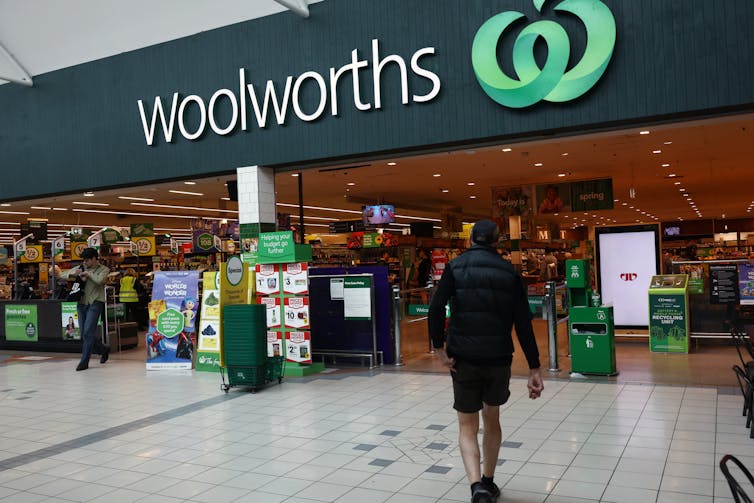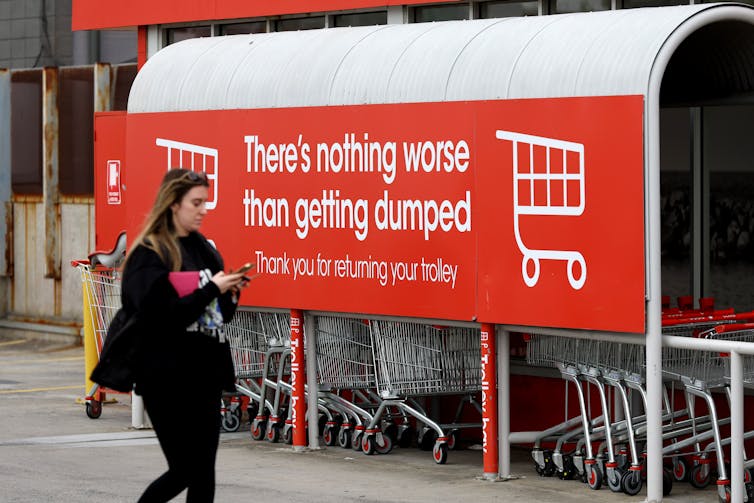It hasn’t been a good week for Coles and Woolworths. On Monday, the Australian Competition and Consumer Commission (the national competition regulator or ACCC) announced it was taking legal action against the big supermarkets over alleged misleading pricing claims.
对于 Coles 和 Woolworths 来说,这并不是一个好星期。周一,澳大利亚竞争与消费者委员会(国家竞争监管机构或 ACCC)宣布,将对涉嫌误导性定价声明的大型超市采取法律行动。
Now the ACCC has issued its interim report on the supermarket inquiry.
现在,ACCC 已经发布了关于超市调查的中期报告。
It reports the supermarket sector is highly concentrated and is an oligopoly. That means a market where just a few sellers control prices, at a cost to competition and consumers.
报告称,超市行业高度集中,是寡头垄断。这意味着一个只有少数卖家控制价格的市场,以牺牲竞争和消费者为代价。
The ACCC also reported hearing “concerning” reports from grocery suppliers about being paid prices below the cost of production but having “little choice but to agree to highly unfavourable terms”.
ACCC 还报告说,从杂货供应商那里听到了“令人担忧”的报告,称支付的价格低于生产成本,但“别无选择,只能同意非常不利的条件”。

ACCC 表示,在继续调查时,它将使用其强制性信息收集权力。Darren England/AAP 图片
The competition regulator was directed by Treasurer Jim Chalmers to conduct the supermarket inquiry. That means it has significantly higher data-gathering powers than those in a consultation.
竞争监管机构由财政部长吉姆·查尔默斯 (Jim Chalmers) 指示进行超市调查。这意味着它比咨询中的数据收集能力要高得多。
The big supermarkets will no doubt be feeling very nervous, as the regulator prepares to sift through their data and scrutinise them closely. In a statement, ACCC Deputy Chair Mick Keogh said:
大型超市无疑会感到非常紧张,因为监管机构准备筛选他们的数据并对其进行仔细审查。ACCC 副主席 Mick Keogh 在一份声明中说:
We are using our compulsory information gathering powers to examine this reported behaviour by the supermarkets, and will include any findings in our final report.
我们正在利用强制性信息收集权力来审查超市报告的这些行为,并将任何调查结果纳入我们的最终报告。
The supermarket oligopoly
超市寡头垄断
The interim report found Australia’s supermarket industry at the retail level is an oligopoly. In his statement, Keogh said:
中期报告发现,澳大利亚的超市行业在零售层面是寡头垄断的。Keogh 在声明中说:
Oligopolistic market structures can limit incentives to compete vigorously on price. We see Woolworths and Coles providing a broadly similar experience to customers through largely undifferentiated product ranges, pricing at similar levels and similar non-price offerings including loyalty programs.
寡头垄断的市场结构会限制在价格上激烈竞争的激励措施。我们看到 Woolworths 和 Coles 通过基本无差别的产品系列、相似的定价水平以及类似的非定价产品(包括忠诚度计划)为客户提供大致相似的体验。
Woolworths and Coles account for about 67% of supermarket retail sales nationally, the ACCC found. ALDI accounts for about 9%, while Metcash-supplied independent supermarkets (IGA and Village Grocer) account for about 7%.
ACCC 发现,Woolworths 和 Coles 约占全国超市零售额的 67%。ALDI 约占 9%,而 Metcash 供应的独立超市(IGA 和 Village Grocer)约占 7%。
The ACCC found little difference in prices, product ranges or loyalty programs offered by Woolworths and Coles.
ACCC 发现 Woolworths 和 Coles 在价格、产品范围或忠诚度计划方面几乎没有差异。
In the final months of the inquiry, the ACCC will scrutinise whether and how the supermarkets are using their market power – and how this affects consumers and suppliers.
在调查的最后几个月,ACCC 将审查超市是否以及如何利用其市场力量,以及这对消费者和供应商有何影响。
In particular, the ACCC will examine whether supermarkets are exercising market power to increase retail prices more than they need to cover higher wholesale costs.
特别是,ACCC 将审查超市是否行使市场力量来提高零售价格,使其超过支付更高批发成本所需的价格。

ACCC 正在审查超市行为的零售和批发方面。Con Chronis/AAP 图片
Market power 市场力量
The ACCC looked at both the retail and the wholesale side of supermarket conduct.
ACCC 研究了超市行为的零售和批发方面。
It said grocery suppliers had told the inquiry of being paid at prices below the cost of production, and of “bargaining power imbalances”.
报告称,杂货供应商告诉调查,他们的付款价格低于生产成本,并且存在“议价能力失衡”。
Keogh said this was “concerning” and the ACCC is using its compulsory information-gathering powers to examine this reported behaviour. Examples given by suppliers include:
Keogh 表示,这“令人担忧”,ACCC 正在利用其强制性信息收集权力来审查这种被举报的行为。供应商给出的示例包括:
being required to pay rebates to retailers for specials and promotions
需要向零售商支付特价和促销的回扣having to use retailer-specified advertising and transport services
必须使用零售商指定的广告和运输服务being made to comply with burdensome accreditation and packaging requirements.
被要求遵守繁琐的认证和包装要求。
The ACCC’s interim report found there were particular issues raised by perishable product suppliers, including weekly tendering processes that lack transparency and transfer considerable risk to suppliers.
ACCC 的中期报告发现,易腐产品供应商提出了一些特殊问题,包括缺乏透明度并将相当大的风险转移给供应商的每周招标流程。
The ACCC is analysing whether the supermarkets are taking advantage of information asymmetries. These can lead to suppliers being unable to make efficient business decisions.
ACCC 正在分析超市是否利用了信息不对称。这些可能导致供应商无法做出有效的业务决策。
Loss of trust 失去信任
The ACCC found Australians are experiencing a cost-of-living crunch, with the price of a typical basket of groceries increasing by more than 20% in the past five years.
ACCC 发现澳大利亚人正在经历生活成本紧缩,在过去五年中,一篮子典型杂货的价格上涨了 20% 以上。
Importantly, consumers told the ACCC they are losing trust in supermarkets’ sale price claims.
重要的是,消费者告诉 ACCC,他们对超市的销售价格声明正在失去信任。
Consumer concerns include:
消费者关注的问题包括:
complicated price changes
复杂的价格变动frequent specials 频繁的特价
short-term lowered prices
短期降价bulk-buy promotions 批量购买促销
member-only prices 会员专享价格
bundled prices. 捆绑价格。
The member-only pricing is a particular bugbear, with consumers expressing concern to the ACCC that they are being penalised for not participating in supermarket loyalty programs.
仅限会员的定价是一个特别的问题,消费者向 ACCC 表示担忧,他们因不参加超市忠诚度计划而受到处罚。
The ACCC also said Australian consumers are better off when they are both sufficiently informed and have sufficient control over the collection and use of their data.
ACCC 还表示,如果澳大利亚消费者既充分了解情况,又对数据的收集和使用有充分的控制权,他们会过得更好。
Of the ACCC consumer survey, almost half of respondents who do not participate in any grocery loyalty programs did not want stores to collect their data.
在 ACCC 消费者调查中,近一半没有参加任何杂货店忠诚度计划的受访者不希望商店收集他们的数据。
The ACCC found that supermarkets collect data via in-store transactions, online stores and mobile apps, and video and audio data.
ACCC 发现,超市通过店内交易、在线商店和移动应用程序以及视频和音频数据收集数据。

消费者告诉 ACCC,他们对大型超市正在失去信任。Con Chronis/AAP 图片
Supermarkets and property plays
It may not be obvious, but access to suitable property is one of the barriers to entry for new and emerging supermarket competitors.
The ACCC observed ALDI has taken more than 20 years to reach a 9% share of national supermarket retail sales.
The ACCC’s preliminary view is Coles and Woolworths have competitive advantages in acquiring new sites as they can outbid other prospective tenants.
It is considering whether this may have implications for barriers to entry.
The ACCC’s preliminary view is that planning and zoning laws may slow a supermarket retailer’s ability to develop new stores.
The ACCC has also been told about alleged “land banking” (acquiring property to stop a competitor from using it) but has not formed any view on the issue.
Where next?
The ACCC says it has selected 14 products – including meats, fruit and vegetables, eggs, dishwashing tablets and pet food – “that will be the focus of detailed analysis over the remainder of the inquiry”. The final report is due in February 2025.
This 14-product analysis could be great news for both suppliers and consumers. It’s unlikely the supermarkets will treat either side of their market badly for these products while the regulator is watching.
If they do, the public hearings set down for November will be even livelier.






